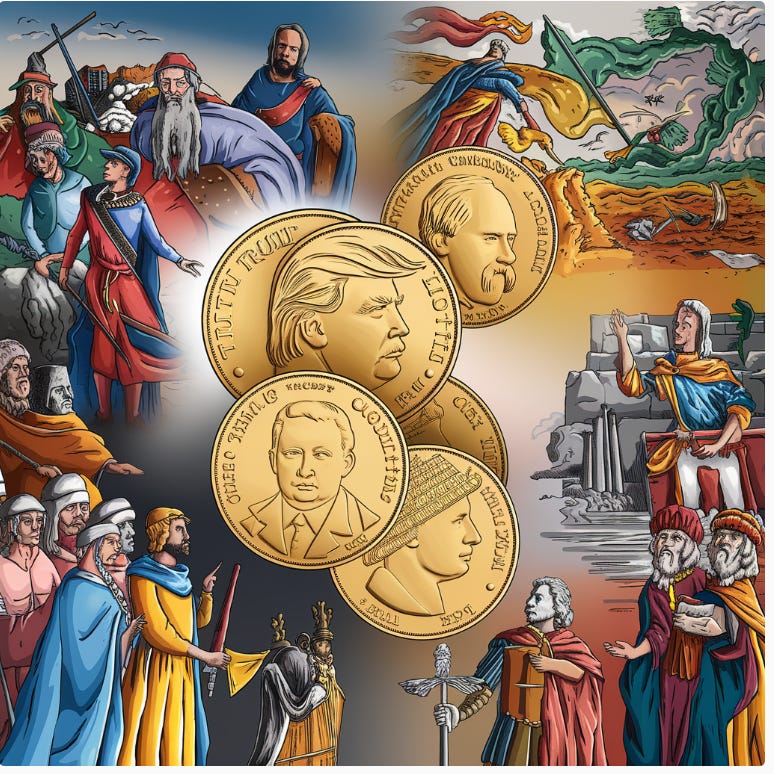Market Miscalculates Again: Why Gold Prices Plummeted After Trump's Election Victory
Despite expectations of a Harris win, Trump's unexpected victory led to a swift market correction, causing gold prices to drop as investors recalibrated their outlook on economic policies & inflation.
Op-Ed by Jon Forrest Little
The gold market experienced a remarkable bull run from February 2024 to Election Day, with prices soaring from $2,000 per ounce to nearly $2,800. This surge was largely fueled by widespread expectations of a Biden-Harris victory in the 2024 US Presidential election. The market had priced in this outcome, viewing it as potentially inflationary and less business-friendly.
However, the election results delivered a shocking twist. Contrary to polls and market predictions, Donald Trump secured victory in all seven swing states, clinching his re-election. This unexpected outcome sent ripples through the financial markets, particularly affecting the price of gold.
In the days following Trump's victory, gold prices plummeted. From Election Day to November 14, 2024, the price per ounce fell from $2,745 to $2,565, a significant 6.6% decline in just nine days. This sharp correction reflected the market's rapid reassessment of the economic landscape under a second Trump administration.
The market's reaction aligned with the perception that Trump's policies would be more favorable for business and less inflationary compared to those expected under a Harris administration. Trump had campaigned on promises of lower corporate taxes, reduced government regulation, and cuts to government programs. In contrast, Harris was associated with higher corporate taxes, increased regulation, and expanded government spending – factors that typically drive investors towards safe-haven assets like gold.
This shift in investor sentiment was not unprecedented. A similar pattern emerged in 2016 when Trump's first election victory caught markets off guard. Then, as in 2024, gold prices fell substantially as investors recalibrated their expectations for the economy and monetary policy.
The decline in gold prices following the 2024 election was part of a broader market adjustment. It coincided with movements in other precious and base metals, changes in the bond market, and a strengthening US dollar. These interconnected market reactions further supported the thesis that investors were rapidly adapting to the prospect of policies perceived as more business-friendly and potentially less inflationary.
In essence, the gold market's behavior around the 2024 election vividly illustrated how quickly financial markets can respond to political shifts and their anticipated economic consequences. The dramatic price movements reflected not just the immediate reaction to Trump's unexpected victory, but also a deeper reassessment of the economic outlook under his second term. As investors moved away from safe-haven assets like gold, they signaled their changing expectations for inflation, economic growth, and government policy in the years to come.
This episode serves as a potent reminder of the intricate relationship between politics, economic policy, and financial markets. It underscores how swiftly market sentiment can change in response to political outcomes, particularly when those outcomes diverge significantly from prevailing expectations. The gold market's journey through the 2024 election cycle thus provides a fascinating case study in the dynamics of financial markets during times of political upheaval and economic uncertainty.
end of segment
Donald Trump, despite having a Republican-controlled Senate and House, faces significant constraints that limit his ability to implement sweeping changes during his second term. One of the primary challenges is the slow-moving federal bureaucracy, which can impede the execution of his policies. Even with a supportive Congress, the complexities of government operations often slow down initiatives, particularly those requiring regulatory changes or extensive coordination across various agencies.
Additionally, Trump is burdened by the staggering $36 trillion national debt, which constrains fiscal policy options. High debt levels can lead to declining IRS revenues as economic growth slows, resulting in increased layoffs and potential bank failures due to systemic risks embedded in the financial system. Without a robust manufacturing base in the U.S., reversing these economic trends becomes increasingly difficult. The decline in manufacturing not only affects job creation but also limits economic resilience, making it harder to stimulate growth.
Moreover, monetary policy is largely in the hands of the Federal Reserve, which operates independently of the presidency. This means that Trump’s influence over interest rates and inflation is limited, as the Fed prioritizes its own economic assessments over political considerations. Consequently, while Trump may propose ambitious reforms and policies, he will encounter formidable obstacles that could hinder his administration's effectiveness and impact on the economy.
Gold is indifferent to the personalities that wield power, whether they are presidents like Trump, dictators like Stalin, or ancient kings. Throughout history, gold has endured regime changes, wars, and the drawing of new maps. It has remained a constant amidst great famines and natural disasters, serving as a reliable store of value and a medium of exchange.
Regardless of political turmoil or economic upheaval, gold steps up to account for the unexpected, providing stability when confidence in currencies falters. Its enduring nature highlights that while leaders may come and go, gold's intrinsic value persists across time and circumstance
our opinions are not sponsor opinions
the editorial department is sole and separate from promotions
not financial advice
Buy Gold and Silver
Upcoming features:
Happy 2025 (The Beginning of The Great Silver Bull Run)
Upcoming Kuya Silver feature, 9 AM EST, January 2, 2025
Summa Silver with video 1 PM EST, January 2, 2025
Introducing Scottie Resources
Update on Missouri, Texas, Indiana and Florida in the fight for sound money




